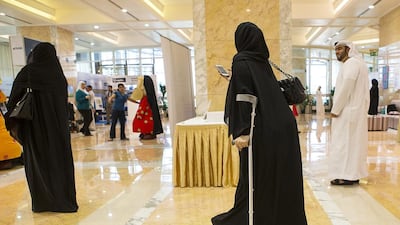Abu Dhabi // Salma Al Tamimi was just six months old when doctors broke the devastating news to her parents that their beautiful baby girl had polio.
The disease dislocated her hips and injured her muscles and hands, forcing her to walk with an aid. But it also strengthened her resolve to help empower other people with special needs.
Ms Al Tamimi, now in her 20s, was one of dozens of advocates for people with special needs at the ABILITIESme ENABLINGme Road Show in Abu Dhabi yesterday.
The event gave a preview of what is to come at the capital’s first three-day congress on disability policy development, management and awareness, to begin in Abu Dhabi on March 24 next year.
Organisations such as the Future Centre for Special Needs, Al Noor Centre for Care and Rehabilitation, and the Zayed Higher Organisation for Humanitarian Care and Special Needs, set up booths offering information about their services.
The day-long event featured speeches and panel discussions among leaders from educational, legal, health and vocational institutions on educating, caring for and empowering people with special needs.
Nannette Wicker-Essick, executive director of the Kids First Medical Centre in Dubai, said education was key to the future success of people with disabilities.
“There are challenges for them to participate in schools,” Ms Wicker-Essick said.
She said many mainstream schools were inaccessible to people with disabilities or did not have adequate resources and staff to support them, while dedicated schools had long waiting lists.
“If they don’t have access to the education system, then it becomes difficult for them to be a part of the society because there’s not really a space for them to fit,” Ms Wicker-Essick said.
There is also the challenge of providing opportunities for people with special needs.
“Children with autism, children with Down syndrome have amazing abilities and amazing potential to show us what they have,” she said.
“They just need the opportunity and they need to be able to do that.”
Ms Al Tamimi can attest to this. The young Emirati credits her family’s support and encouragement for her success.
Her father pushed her to not let her disability stop her from achieving her goals.
“Be independent, learn everything,” Ms Al Tamimi said her father had told her. “He was always supportive and encouraged me to do my best.”
When she could not use her right leg to drive, she taught herself to accelerate and brake with her left leg. When she came to a steep set of stairs, she asked passers-by for assistance.
She wrote notes to officials suggesting ways to improve accessibility when she found physical barriers.
“I don’t shy away from asking for help or from going to the people who are responsible to say ‘please change this’,” Ms Al Tamimi said.
She now works as a teacher of deaf students at the Zayed Higher Organisation for Humanitarian Care and Special Needs, and volunteers at the deaf association.
Ms Al Tamimi tries to instil in her students the same confidence in their abilities her parents instilled in her.
“If I believe in your abilities I will do everything, my best, to make you succeed,” she said. “Because if we don’t believe (in the abilities of people with special needs), we can’t help.”
rpennington@thenational.ae

